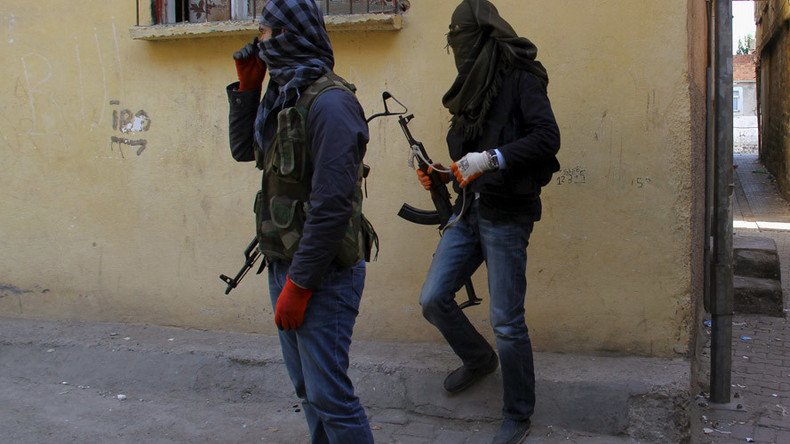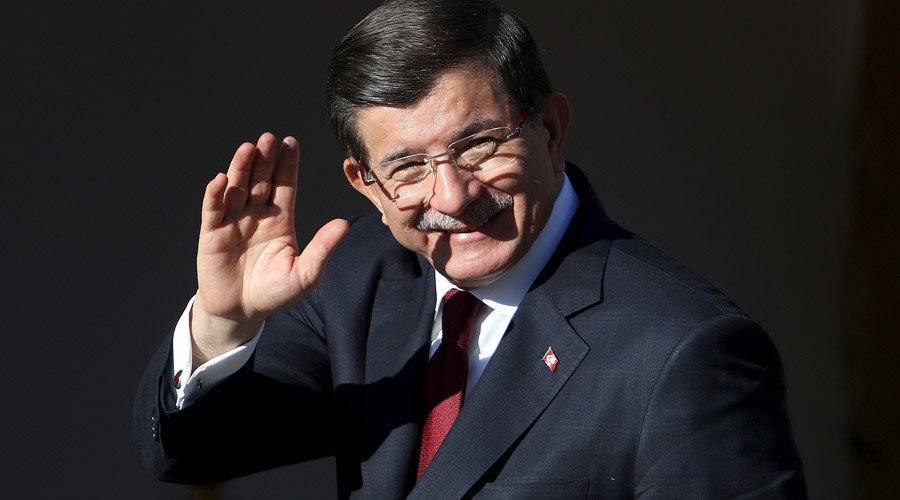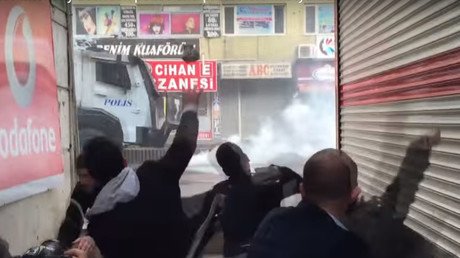‘Turkey gives higher priority to Kurdish separatist movements than Islamic State’

Turkey has a high priority in the conflict in Syria now, and that is to prevent Kurdish autonomy in the region, as it fears that could lead to separatist movements within Turkey, says Stuart Rollo, journalist and research assistant at Sydney University.
Local police dispersed thousands of protesters in the Turkish city of Diyarbakir on Tuesday. The crowds were demanding an end to government-imposed curfews across the southeast of the country.
READ MORE: Turkey supports ISIS, wants to revive Ottoman Empire – Syria’s UN envoy
RT: Kurds in Iraq and Syria are on the frontline battling ISIL making vast gains, but Turkey is bombing the Kurds. How does that add up with Ankara's claim that it is fighting ISIL?
Stuart Rollo: Well, it is quite interesting. Basically, Turkey has a high priority in the conflict in Syria at the moment and that is to prevent Kurdish autonomy in the region because it fears that could lead to separatist movements within Turkey. So, ISIL comes second in Syria at the moment to Turkey.
RT: Do you think that Turkey’s stance against the Kurdish forces ultimately might undermine international efforts to fight ISIL in both Syria and Iraq?
SR: Definitely, I think that as long as it seems to Turkey that the result of defeating ISIS will be strengthening the Kurdish forces in Syria then that is going to be a bigger problem to them than ISIS.
RT: In a nutshell, who is Turkey’s main priority right now - ISIL or PKK, Kurdistan Workers' Party?
SR: PKK... Well, its main priority is to prevent separatism within Turkey, which are Kurdish political parties and forces, and also to establish, to strengthen, the Sunni Arab opposition in Syria and to make sure that they are in a position to dictate the terms of whatever peace eventually does come to Syria.
RT: It is quite well known that the Erdogan family is opposed to the Assad family, and it has been for some time. In the meantime Russia has provided evidence of alleged Turkish oil deals with ISIL. We’ve seen no actions from Turkey’s Western partners. Why do you think that is?
SR: ... They [Erdogan and Assad] actually had quite a congenial relationship up until the Arab Spring. Erdogan really saw that as an opportunity; he thought that the Assad government would fall as quickly as we saw other governments in the Middle East fall; and that he could take advantage of that and put in place preferably for him a Muslim Brotherhood government in Syria and that would act as a client state for Turkey much in the same way that Assad regime is a client state for Russia and Iran.
RT: We have seen very little mention in the Western media regarding Russia's satellite and drone evidence of Turkey's ongoing oil trade with ISIL. Why?
SR: I think that the idea that Turkey is used as a logistics hub for ISIL in selling the oil is accepted and reported in the Western media. I suppose it is a matter of verifying what those satellite images really mean. And from nothing I’ve read has really confirmed that the direct relationship between the Erdogan government and ISIL in selling that oil exists. So I suppose it is a matter of the intelligence confirming what appears in the satellite images…
It [oil] definitely passes over the [Turkish] border, but it is a matter of it is direct involvement.
RT: Do you think it is anything to do with the fact that Turkey is a NATO member, and NATO perhaps is happy to see this kind of illicit oil trade going on with what is supposed to be the biggest terrorist group in the world?
SR: I don’t think that Western media is stopping reporting on this because Turkey is part of NATO. I’ve read a lot an academic work, as well as media that document the trade. It is a matter of establishing the exact links that have been alleged in the Russian media between Erdogan’s son and the oil trade, which I haven’t seen totally compelling evidence of yet. I’d be very interested to see if any emerges.

Is Turkey's EU membership back on the table?
Journalist Bryan MacDonald also shared his opinion with RT on Turkish membership in the EU.
RT: Why do you think Turkey's accession is being delayed?
Bryan MacDonald: We’re right back in the territory of the mid-80s here. Turkey first applied to join the EU over 30 years ago. At that time the EU had only nine members. It expanded dramatically since then to 28 and Turkey has been bypassed all the time. It seems to me that Turkey is trying to use the situation in Syria and its geopolitical tussle with Russia in order to bring this potential EU membership back on the agenda. However, I think it is ‘pie in the sky’ - it is just kind words they are getting from the EU because they are useful to NATO and the EU at the moment. I don’t see any possibility that 80 million Turks who are Muslims in a largely Christian EU will ever be allowed to join the organization.
RT:Turkey's Prime Minister seemed pretty happy during the Turkey-EU summit last month. What's changed?
BM: The whole thing is very mystifying. It’s only a couple of years ago since [Frank-Walter] Steinmeier, the German Foreign Minister, said there will be no EU expansion for at least 10 years. We also deal in the real world here. There are two worlds. There is a world where everybody pats Turkey on the head, and for that matter Ukraine, and says that EU membership is obtainable for these countries.
And then there is another world, where the UK maybe out of the EU by this time next year; a world where other countries are teetering on the brink with the EU - countries like the Czech Republic, countries like Greece, even Denmark and Finland are starting to rail against the EU; a situation where within the next 18 months it’s possible that France may have anti-European government; there is a possibility there could be a coalition in Spain very shortly where one wheel of the coalition is against EU membership. There is a whole lot of things happening in the real world that kind of makes me think that these platitudes and assurance being given to Turkey are said very much tongue in cheek.
The statements, views and opinions expressed in this column are solely those of the author and do not necessarily represent those of RT.













